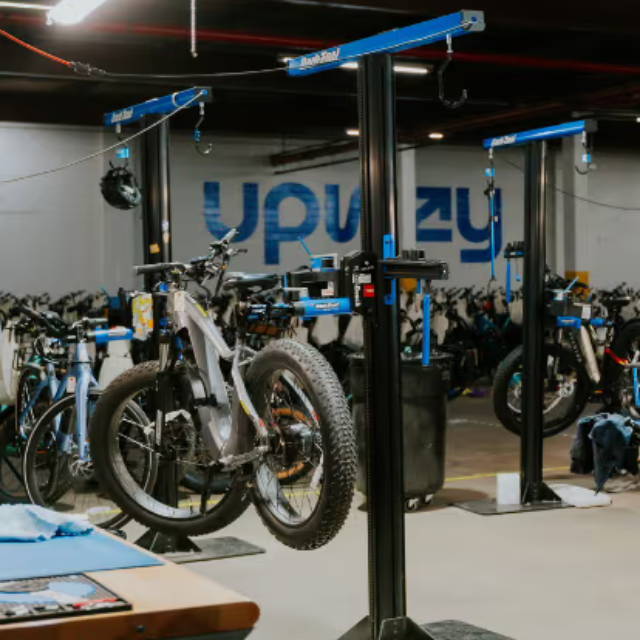Some states specify a minimum age for riding an e-Bike. States like Massachusetts, Pennsylvania, and Oregon require that riders be 16 or older, for example. Other states permit e-Bike use at 14 or 15 years old, while others don’t have an age limit.
E-Bike Myths Debunked: Separating Facts from Fiction
Written by: Rémy Rossi | June 14, 2025 | Time to read 5 min
Are e-Bikes Apollo’s mythological chariots or a real-world transportation solution? Discover the truth behind common e-Bike myths in this fact-filled guide!

More about the Author: Remy Rossi
Rémy Rossi is a bike writer, mechanic, and educator who got his start in community-based bike shops and co-ops. With a decade in the industry, he still wrenches on bikes when he can and plays bike polo on a fixie.

All this mystery mixed with presumed simplicity can lead to a swarm of rumors, myths, and misconceptions. My experience as a bike mechanic has helped me set the record straight, but it’s not so easy to separate fact from fiction as a casual rider. In this article, I’ll explain the truth behind some of the most common myths regarding electric bikes.
👋 Upway says hi!
Table of Contents
Myth #1: You need a license and insurance to ride an electric bike
Myth #2: Electric bikes aren’t good exercise
Myth #3: You can’t ride an e-Bike in the rain
Myth #4: E-Bikes aren’t good for the environment
Myth #5: If a battery runs out of juice, you’re stuck
Myth #6: Electric bikes are expensive to maintain
Myth #1: You need a license and insurance to ride an electric bike
However, riders of Class 3 e-Bikes in New Jersey need a license, and e-Bike users in Hawaii will need to pay a $30 registration fee. Local rules may vary, so it’s worth checking with your city for the most up-to-date regulations regarding electric bikes. E-Bike insurance, such as a policy from Sundays, can be worth it to protect your investment, but it isn’t required to ride an e-Bike.
Myth #2: Electric bikes aren’t good exercise

For example, daily e-Bike use (12–15 km) can enhance heart health, lower cholesterol, and reduce disease risk. And when compared to regular bikes, e-Bikes still promote moderate to strenuous exercise to get that heart rate up. Uphill efforts on an e-Bike, when assisted, can offer intense workouts that feel easier or can be sustained for longer periods.
Myth #3: You can’t ride an e-Bike in the rain

The water-resistance level of an e-Bike is indicated by an IP rating— numbers like IP65, IP66, and IP67. Feel free to ride your electric bike in the rain, but do avoid washing the bike with a high-powered pressure washer, which could damage certain seals.
Myth #4: E-Bikes aren’t good for the environment
Myth #5: If a battery runs out of juice, you’re stuck

You don’t have to worry about getting stranded with a dead battery. Electric bikes can still be pedaled like a normal bicycle if the battery runs out of charge or you simply don’t want any assistance. Modern motors have very little resistance when powered off, so you’ll hardly notice the difference anyway.
Myth #6: Electric bikes are expensive to maintain

E-Bikes are incredibly reliable and require very little maintenance on top of what you’d expect for a standard bicycle. The closed systems of the battery and motor are self-contained and protected from the elements, and are very rarely the first problem to arise. More common issues are typical things like needing to adjust the brakes, fix a flat, keep clean, or replace tires. Most e-Bikes have hydraulic disc brakes, which are trickier to fix and may require a professional’s help, though.
Frequently Asked Questions
Is there an age limit for e-Bikes?
Do you need a license for an electric bike?
In nearly all states, riders do not need a license to operate an electric bike. However, riders of Class 3 e-Bikes in New Jersey need a license, and e-Bike users in Hawaii will need to pay a $30 registration fee.
Are helmets required when riding an e-Bike?
Helmets are always a good idea when riding any type of bike, and some states require them. Pennsylvania, Massachusetts, and Oregon are some of the states that require wearing a helmet when riding an e-Bike, though most states don’t have a legal requirement.
What are the tariffs on electric bikes?
The current import tariff on bicycle products from China sums to 66%, including the 11% base duty, 25% Section 301 tariffs, 20% fentanyl tariffs, and the 10% baseline tariff. Electric bicycles have a 55% tariff and most bicycle components have a duty between 55% to 65%.
What is the warranty on Upway bikes?
Upway offers a one-year limited warranty on all its e-Bikes that covers mechanical and electrical defects. We also provide guaranteed delivery and will compensate as warranted in the rare case of any shipping damage.
Key Takeways
- E-Bikes still offer serious health benefits, including improved fitness, heart health, and weight management—even if the workout feels easier.
- You likely don’t need a license or insurance to ride an e-Bike in most states, but always check your local regulations for exceptions.
- E-Bikes are rain-ready, eco-friendly, and low-maintenance, making them a practical, sustainable alternative to cars and traditional bikes.


